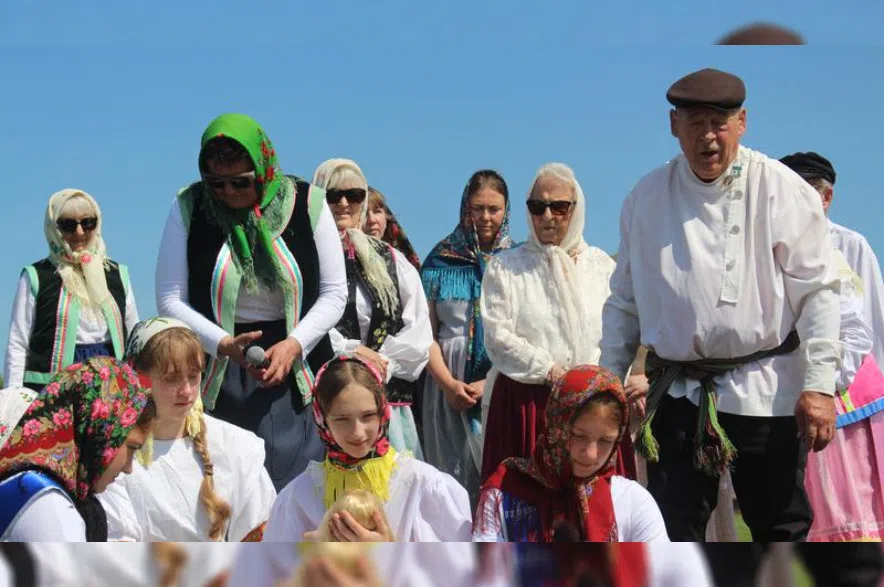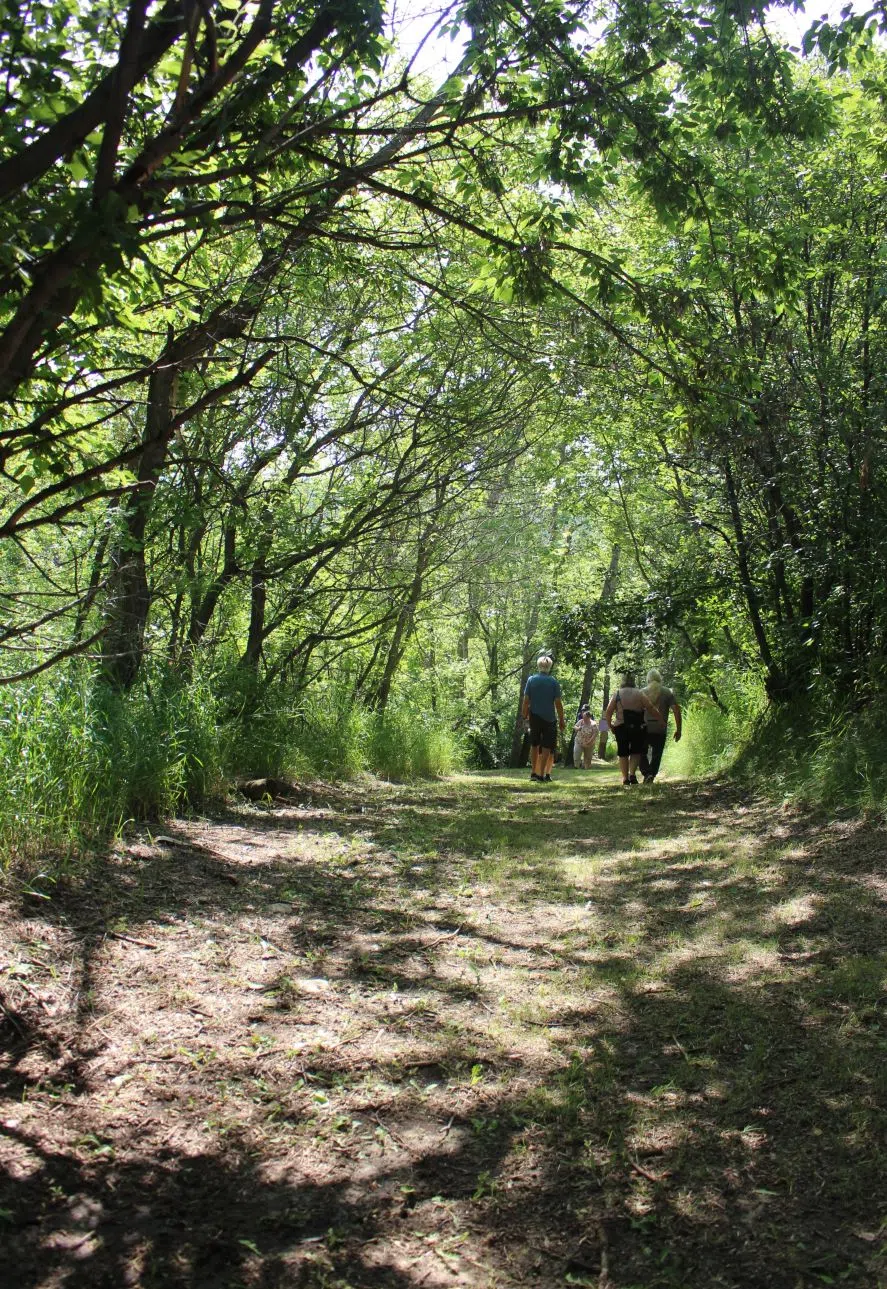Against the backdrop of the serenity that only a summer’s bucolic environment can offer, the great-great-grandson of a man killed in a train explosion 100 years ago took to the podium to speak of peace.
“The word ‘Community” has been used today, you know there was a time when we spoke about our global community, there was a time when people spoke about a peace dividend,” said J.J. Verigin.
Travelling from British Columbia to join in the Blankets of Comfort ceremony and the grand opening of the overnight experience at the Doukhobor Dugout House National Historic Site of Canada, the great-great-grandson of Peter “the Lordly” Verigin, who first established the Canadian community, was among the dignitaries to speak to the audience about the historical importance.
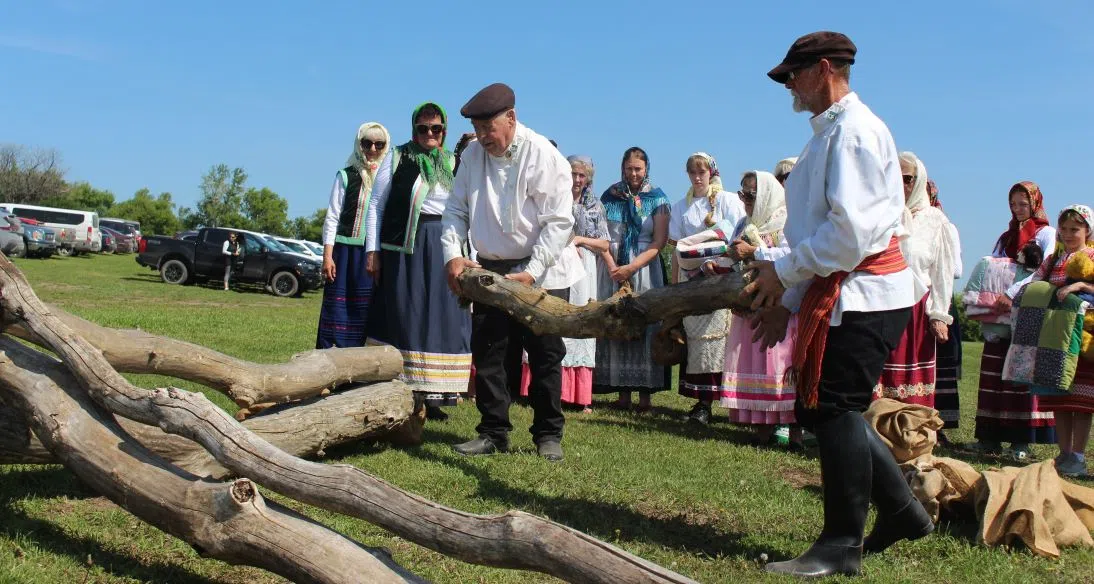
Volunteers reenact how the original Doukhobors would build a dugout house during the grand opening of the overnight experience at the National Historic Site. (battlefordsNOW)
“I wonder if we’ll ever come to a point where, as human beings, we will spend our human resources, our financial resources – all of our resources – looking for a way for us to live together better as opposed to how we can kill each other better.”
The Blankets of Comfort event brought visitors – some of whom are descendants – of the original Doukhobors who landed in the Blaine Lake area in 1899 following exile from Tzarist Russia – for a chance to remember and honour their ancestors’ perilous journey and subsequent settlement. The overnight experience came about due to the support and partnership of SaskCulture.
The religious community has origins that trace back to the 18th century in Russia. The group, whose name literally translates to “Spirit Wrestlers” were pacifists who faced religious persecution. Among the peasants’ objections included religious icon worship and refusal of conscription into the Russian military. Indeed, they destroyed all weaponry in what’s become known as the “burning of arms” in 1895.
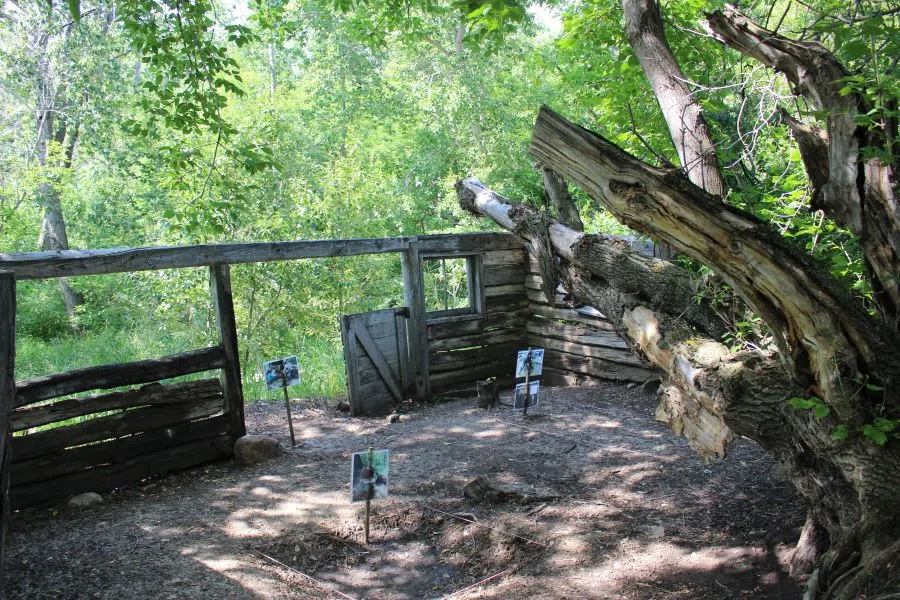
Remnants of dugout house 1, during the grand opening of the overnight experience at the National Historic Site. (battlefordsNOW)
After being exiled and with the support of Quakers and Leo Tolstoy, roughly 6,000 members of the community were able to make the crossing to Canada and begin life anew.
Meanwhile, the site’s development into what has become a touchstone in Saskatchewan’s history began 20 years ago with an archeological dig.
“In 2004, there was what we would now call a community-based archeology project here at the site,” said Executive Director Tomasin Playford, PhD with the Saskatchewan Archeological Society (SAS) of the Doukhobor Pit-house Public Archeology Project.
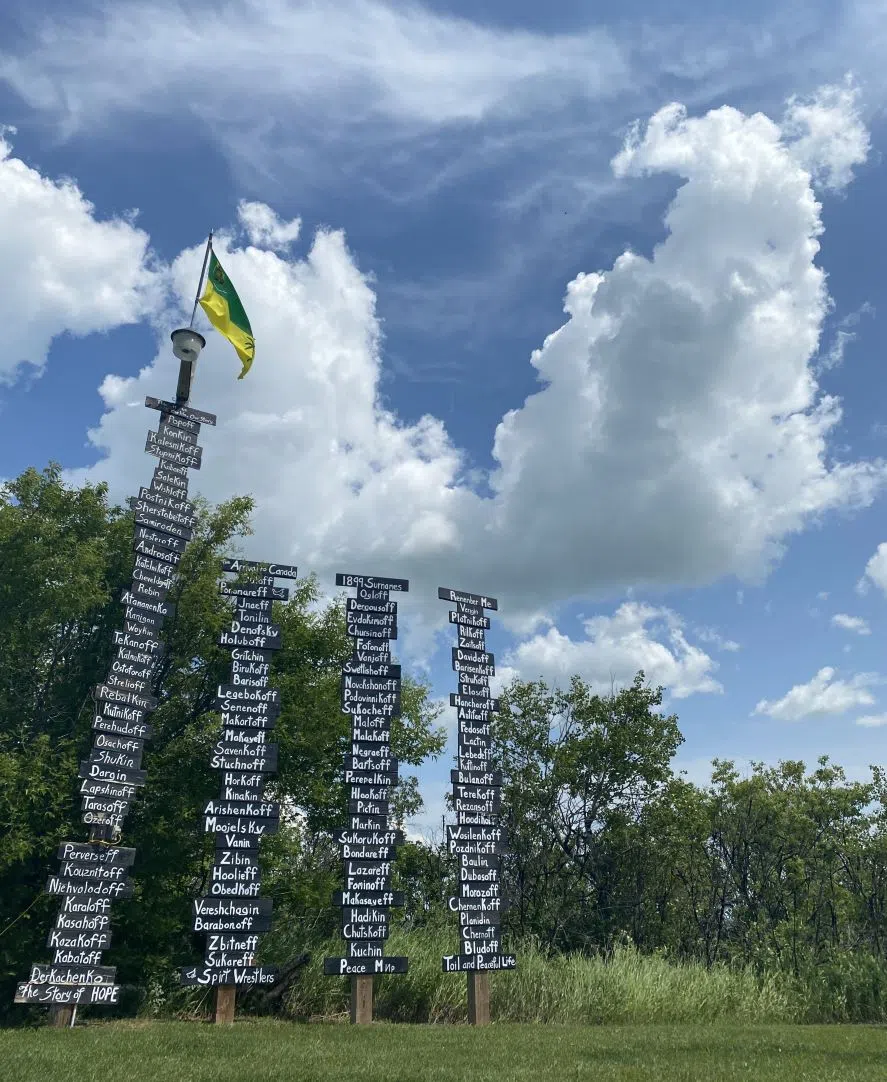
A list of names bare witness during the grand opening of the overnight experience at the National Historic Site. (battlefordsNOW)
“The SAS supported the project through funding, which enabled community members to experience hands-on heritage through the careful excavation of one of the pit houses and features in the nearby village site.”
According to Playford, this is what comes to mind when people think of the discipline, however, she said it was more than that.
“Archeology is one way to know, learn and relearn the past. It has a role in preservation as it’s done here, in physical spaces that we see around us today.”
Reflecting on the day’s event, Founder Brenda Cheveldayoff said the grand opening “means a whole lot to me.”
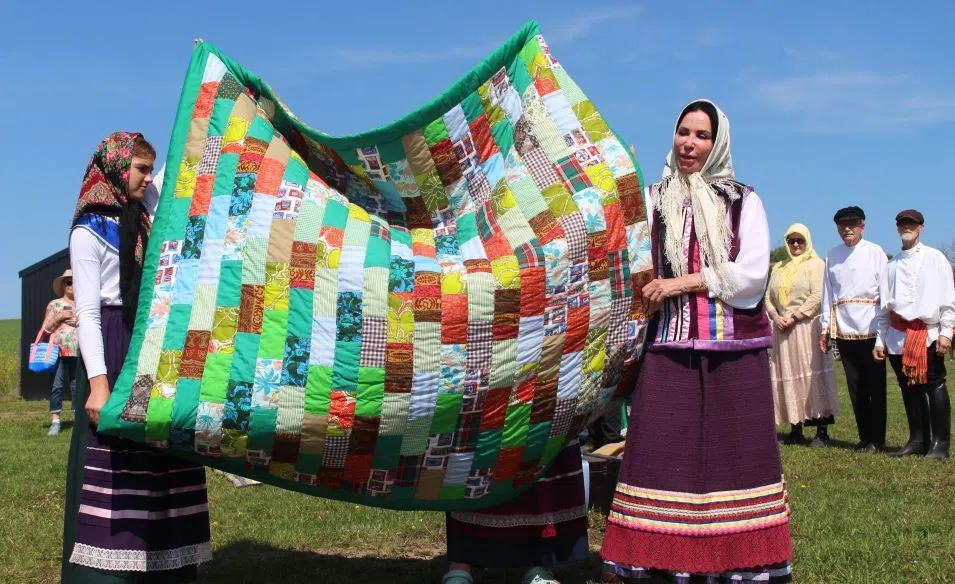
One of the Doukhobor Ambassadors, Bailey Penner helps Founder Brenda Cheveldayoff with a blanket presentation to dignitaries during the grand opening of the overnight experience at the National Historic Site. (battlefordsNOW)
“It’s about what it was like to spend the night so, can you imagine the people that get to stay there this year? They’re the first, just like the Doukhobor people were the first to stay here in 1899.”
The overnight area offers visitors a camping experience in wooden pods named for the two men who helped thousands start over in a new land.
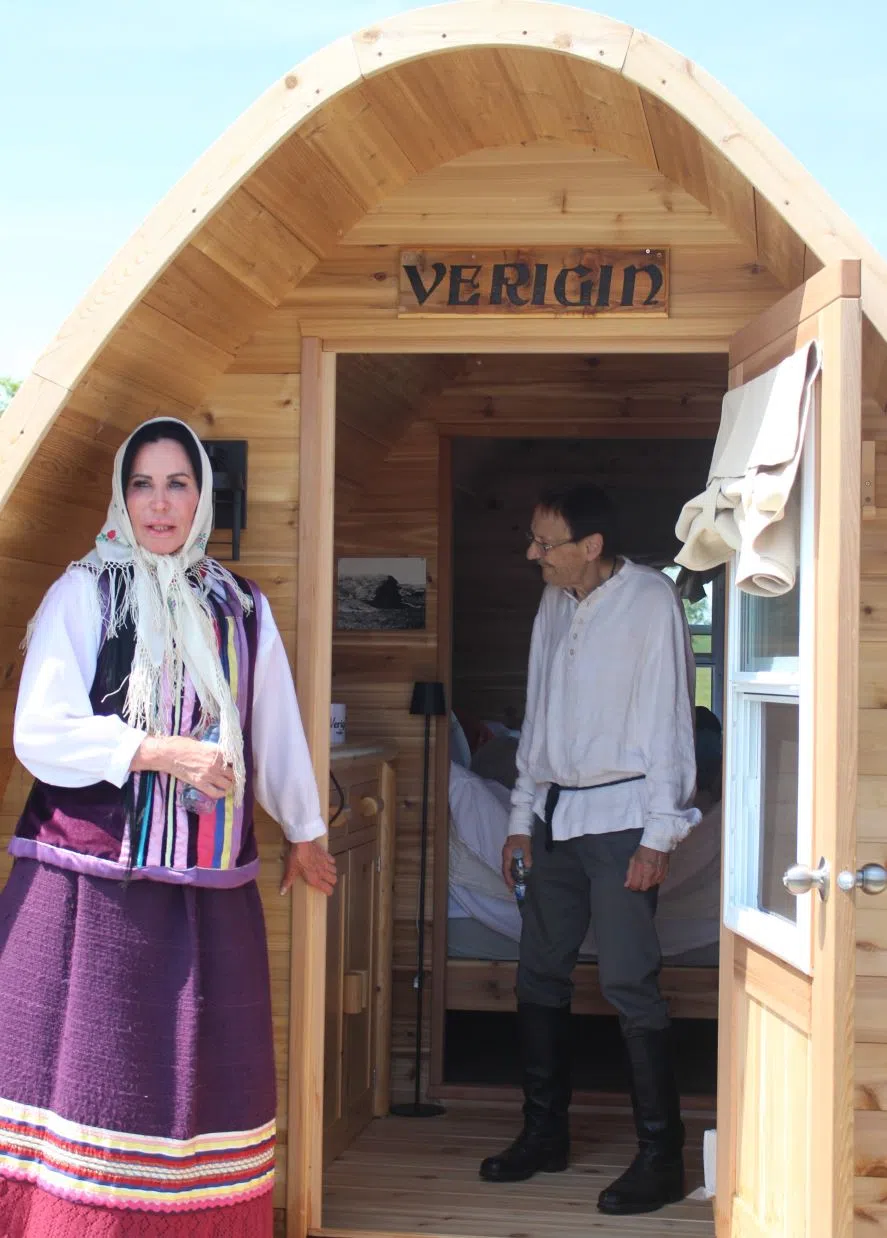
Founder Brenda Cheveldayoff and J.J. Verigin checking out one of the new pods named after his Great-Great Grandfather. (battlefordsNOW)
The Verigin and Tolstoy pods sit on land overlooking a pastoral scene beyond compare. The area features outdoor showers, washrooms and even a fire pit.
According to Volunteer Stella Pronkiewicz, she and others who took part in the day’s festivities through reenacting an arrival scene, received a history lesson in the process.
“It’s a shock,” she said, referring to the original dugout house site.
“It’s unbelievable what they…the hardship they had to go through.”
Pronkiewicz said the preservation of the site where the houses, built on the side of the hills down a ravine, made of cut logs and are now overtaken and reclaimed by nature, “is amazing.”
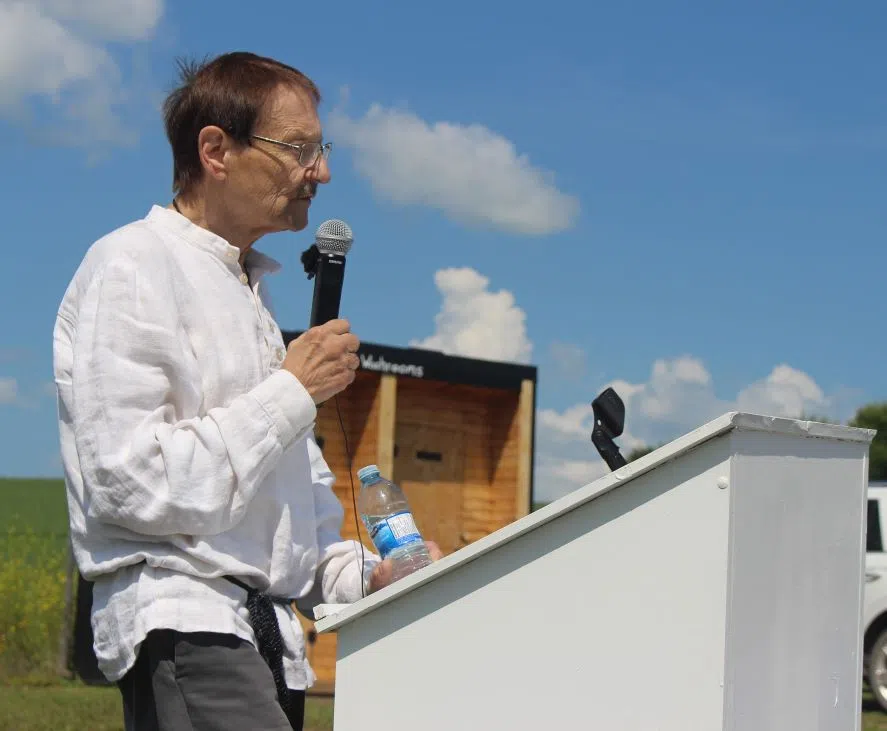
J.J. Verigin speaks during the grand opening of the overnight experience at the National Historic Site. (battlefordsNOW)
“They continue to enhance and to expand on that, that their children – they are getting them involved and learning about all this is to make sure that the memory of what their ancestors went through lives on.”
Two years ago, Carolyn Genge and her family came to experience the site, but it wasn’t open. Upon hearing of the expansion, they knew they needed to be in attendance.
“I’m excited to see the dugout house,” she said.
“You can imagine it, but until you’re in it, we’re coming from a place where we got a computer in our pocket,” she said, referring to the ease of obtaining information.
“They were coming from a place where they were persecuted, crossing their fingers that they’d be able to make it when they got here. So, I think it would’ve been ridiculously difficult, unimaginably.”
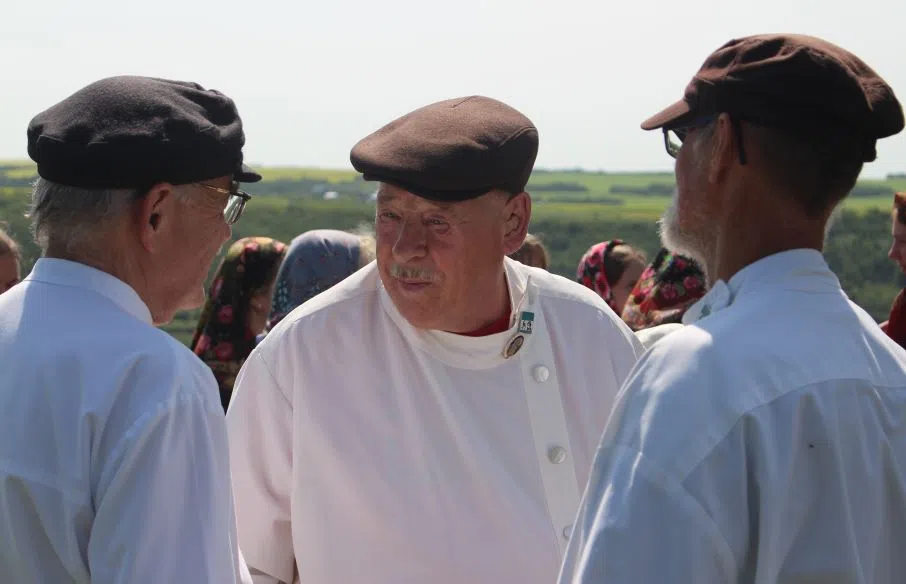
Volunteers chat and get into character during the grand opening of the overnight experience at the National Historic Site. (battlefordsNOW)
Verigin, the Executive Director of the Union of Spiritual Communities of Christ (USCC) Doukhobors, spoke later in the day to battlefordsNOW of the current state of the world and said it will take a seismic shift in philosophy to get humanity to a place of kindness.
“People think when they use the word discipline, they usually attach to it martial connotations,” he said.
“There is nothing – nothing – in the world that I’ve experienced or encountered that takes more discipline than the expression of selfless, unconditional love,” he said.
